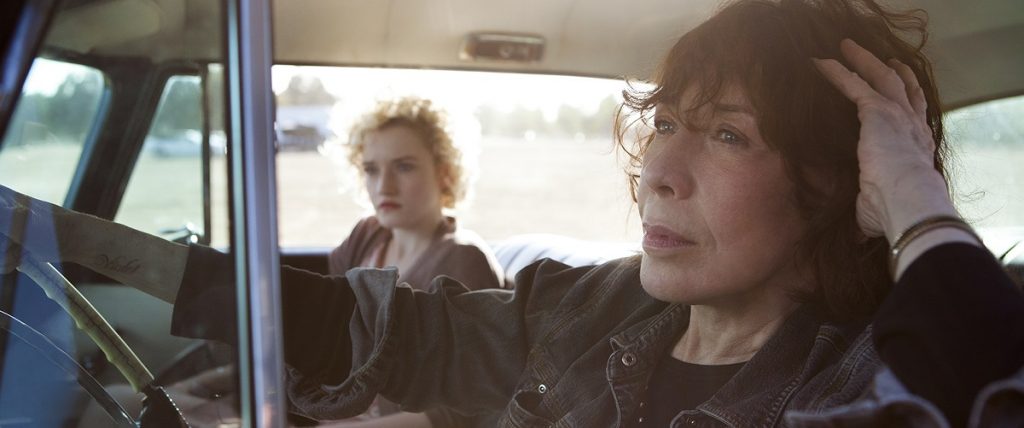Respond to these rapid questions in our Grandma quiz and we will tell you which Grandma character you are. Play it now.
“Grandma” is a small-scale character comedy-drama that, by the time it’s through, exerts an almost startlingly powerful emotional force. I went to see the movie with some skepticism, but came out almost in tears and appreciative for the journey writer-director Paul Weitz and a superb cast, lead by Lily Tomlin, had taken me on.
The film “Grandma” opens with Lily Tomlin’s character, Elle, an elderly poet with a strong feminist cult reputation, apparently being super unpleasant to Olivia (Judy Greer), the younger girlfriend she’s dumped. Written and directed by Paul Weitz, whose well-intentioned but patchy track record (prior films include “Admission,” “Being Flynn,” and “About A Boy,” which for me ran a gamut from mildly In a graduating cap and gown, she sits alone in her home poring over old pictures; the spectator can infer that Elle has recently experienced other losses in addition to Olivia’s exclusion. Sage, Elle’s curly-haired, gamin-like granddaughter, appears at the door (Julia Garner). Sage is pregnant, broke, and due to get an abortion in roughly eight hours—a situation that is not gaminesque.
But you shouldn’t waste any more time and start this Grandma quiz.
Grandma Quiz
Sage’s refusal to visit her own mother, from whom Elle is somewhat estranged, why Elle only has about $40 available at the moment, and why Elle and Sage left in a possibly-not-perfectly maintained vintage Dodge are all questions that are best answered by actually seeing the film rather than reading about it in a review. Weitz certainly didn’t seem to have what it had to write this kind of movie. It’s hilariously literary, with one character using the word “solipsist” as an insult in a comical argument scene. The film actually communicates more relevant things about both the inner and outward lives of a writer than the regrettably much-bruised “The End of the Tour.” On what appears to be good bond paper, he splits the scenes into chapters with their titles printed in lower case. Even as Elle struggles with the reality that her granddaughter has never heard of “The Feminine Mystique,” Sage and Elle learn to know one another better. However, as their pursuit of money starts “shaking the skeletons” of their individual pasts, Elle’s politics and aesthetics are also upended.
Also, you will find out which character are you in this Grandma quiz.
About the quiz
I had some initial reservations about the movie’s emphasis on invoking Elle’s counterculture values in order to parody them for comic effect. But no. In spite of its critical examination of those principles, the film mostly ends up endorsing them, especially when it comes to women’s rights. When Elle, who has been a lesbian for longer than her granddaughter has lived, meets up with an old friend, Karl, played by an initially friendly Sam Elliott, it is one of the movie’s most startling scenes, titled “the ogre.” The scene is essentially a snapshot of the 1960s, complete with all of their triumphs and flaws. Additionally, Elliott delivers a performance that enthuses the audience emotionally. It’s truly incredible stuff. By the time this moment appears, it is obvious that this film intends to put Tomlin’s humorous persona on fire and let it burn rather than using its former edginess as a reservoir for sentimentality. Compared to Tomlin’s previous collaborations with Robert Altman, this movie is far more polished, yet it shares the same dedication to emotional truth. With the appearance of Sage’s mother, performed expertly by Marcia Gay Harden, it stays true to that promise.
Also, you must try to play this Grandma quiz.
Is this movie political? Any movie that portrays abortion as a routine medical operation carried out by concerned medical experts as opposed to Something Not Done or a Traumatic Life Ruining Moment is, by definition, political in the United States. The fact that the film confronts women’s self-determination without even the slightest apology will draw criticism in and of itself. I don’t want to start a fire in the comments section, but I must admit that I completely understand this viewpoint. However, the politics—including the fact that the film passes the Bechdel Test with a score of 100—are only a small element of this truly exceptional film. Yes, the humanity is the other component. the way in which the movie depicts the damage caused by severed bonds and the healing made possible by their tentative restoration. Humor is present as well, and there is a lot of it. Even though it has a short running time, “Grandma” is a modest film that doesn’t feel insignificant.
For more personality quizzes check this: Grandma Quiz.





